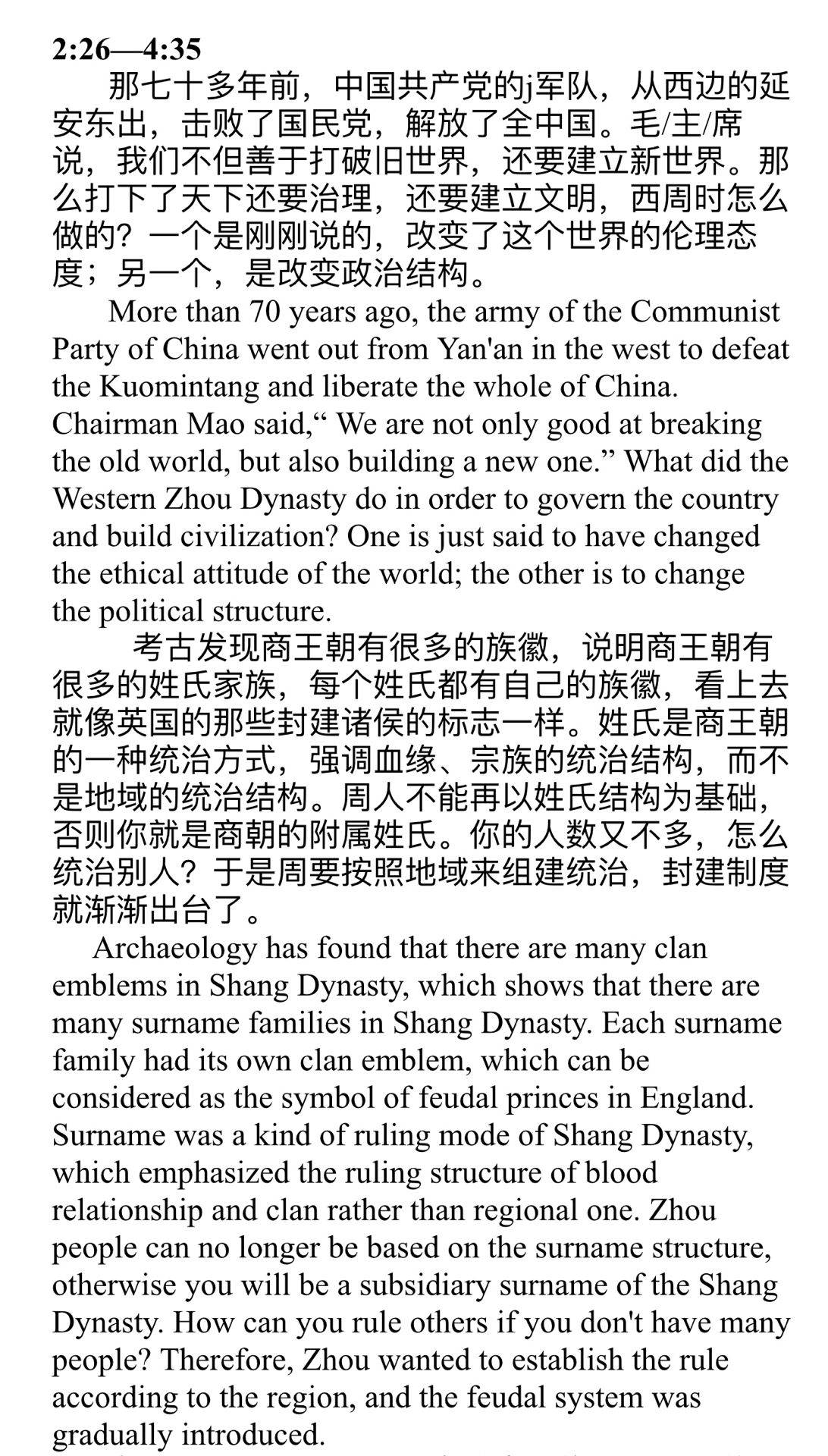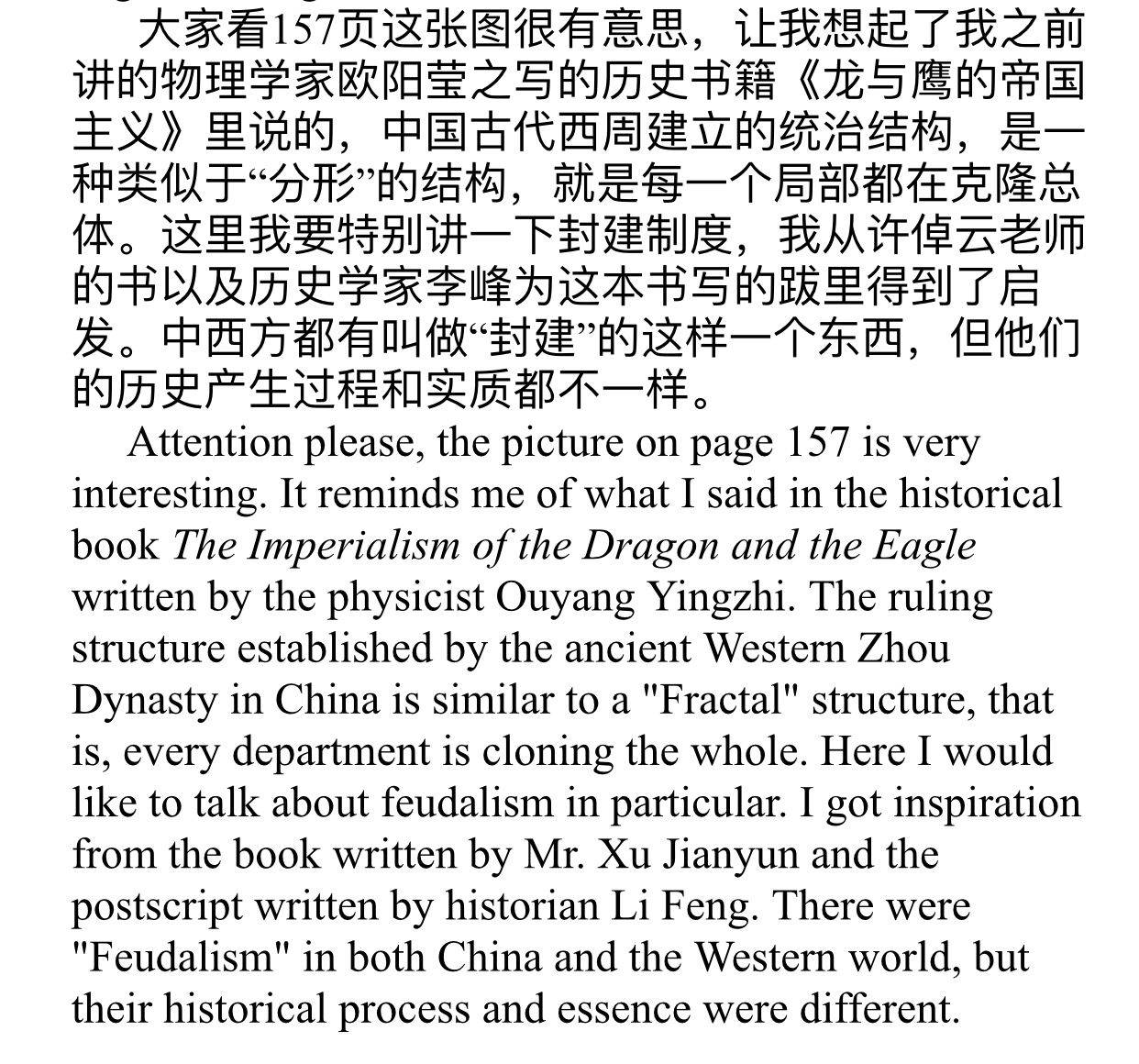50‘-2’50
五经包括《诗经》《尚书》《易经》《礼记》《春秋》。这些书孔子很遵从,秦朝时期这些书被烧毁,儒学者们被活埋。后来相关的刻字文字在孔子居住的遗址的墙上被发现。这部古籍的鉴定很难证明。 有人认为,其中的一部分可能是后来的儒家为了写一部符合儒家理想的道德政治理论的历史而编造的。为什么历史学家不同意呢?书中的历史反映了历史学家选择相信的。除了后期的几章以外,这些章节都是作为国王或其他重要人物正式演讲的记录。大多数演讲都是由标题所指示的五种类型之一。第一种,謨。第二种,訓。第三种:命。第四种:誓。第五种,誥。首先:謨中有两章,大禹謨和皋陶謨。这些謨是国王和大臣们就国内外重要问题进行的磋商。
回复
(2)
收起
-

-
 回复 13637856929:商是文化中心,人口达百万,而考古认为,周只有七万左右的人口,所以就认为商朝是正统。更重要的是周王朝开始了反思,因为他们看到大国商居然会输给自己,他们把自己给惊呆了。他们想到自己也可能灭亡,于是就要研究一下,找出经验教训来警告自己。他们总结的结果是,谁丧失了天命,谁就会灭亡。许倬云说,周人崇拜“天”,而商崇拜各种宗族神,这可能和地理条件有关系,因为周人住在西边的黄土高原上,一抬头都是天,完整的天,所以他们崇拜天,于是周把天命正统归于失败者,这样自己就是从失败者手中继承了天命。他们又认为天意来自于民意,于是开始重视人民的生命。他们强调天人感应,天要照顾苍生。同时,周因为联合各个小国一起攻打商国,所以要安抚这些小国,于是形成了一种讲究和谐的风格。所以西周开创了中国人勤于反思、反求诸己的一种伦理态度。现在有些国家,出了事情就怪别人。打下了天下要治理,还要建立文明,西周是怎么做到的?一,改变这个世界的伦理观。二,改变政治结构。考古发现商王朝有很多的族徽,说明商王朝有很多的姓氏家族,每个姓氏都有自己的族徽。姓氏是商王朝的一种统治方式,强调血缘与宗族的统治结构,而不是地域的统治结构。周人不能再以姓氏为基础,否则你就是商超的附属姓氏。 The Shang dynasty was a cultural center with a population of one million, while archaeology suggests that the Zhou had a population of only about 70,000. Therefore, the Shang dynasty is regarded as orthodox. More importantly, the Zhou Dynasty began to reflect, for they were shocked to see the great merchants losing to them. They thought that their own country might also perish, so they studied for lessons to warn themselves. They concluded that whoever loses his mandate of heaven will perish. Mr. Xu Zhuoyun said, Zhou people worshipped "sky", while Shang worshipped various clan gods, which might be related to geographical conditions. The People of Zhou lived on the loess plateau in the west. Every time they looked up, there was sky, complete days, so they worshipped the sky. Thus Zhou legitimized the mandate of Heaven to the loser, thus inheriting it from the loser. They also believed that the will of Heaven came from public opinion, so they began to attach importance to the lives of the people. They emphasizing that heaven and man should be sympathetic, and heaven should take care of the people. At the same time, Zhou allied with the small states to attack the Shang, so he wanted to pacify them. As a result, zhou developed a style of paying attention to harmony. Therefore, the Western Zhou Dynasty created a kind of ethical attitude of the Chinese people, which was diligent in reflection and self-seeking. Now in some countries, when something goes wrong, it's someone else's fault. How did the Western Zhou Dynasty achieve this goal? Firstly, change the ethics of the world. Secondly, change the political structure. Archaeology found that there were many clan emblem in Shang Dynasty, which showed that there were many surname families in Shang Dynasty, and each surname had its own clan emblem. Surname is a kind of ruling mode of Shang Dynasty, which emphasizes the ruling structure of blood relationship and clan rather than regional one. Zhou people can no longer be based on surnames, otherwise you will be a subordinate surname of Shang Dynasty.
回复 13637856929:商是文化中心,人口达百万,而考古认为,周只有七万左右的人口,所以就认为商朝是正统。更重要的是周王朝开始了反思,因为他们看到大国商居然会输给自己,他们把自己给惊呆了。他们想到自己也可能灭亡,于是就要研究一下,找出经验教训来警告自己。他们总结的结果是,谁丧失了天命,谁就会灭亡。许倬云说,周人崇拜“天”,而商崇拜各种宗族神,这可能和地理条件有关系,因为周人住在西边的黄土高原上,一抬头都是天,完整的天,所以他们崇拜天,于是周把天命正统归于失败者,这样自己就是从失败者手中继承了天命。他们又认为天意来自于民意,于是开始重视人民的生命。他们强调天人感应,天要照顾苍生。同时,周因为联合各个小国一起攻打商国,所以要安抚这些小国,于是形成了一种讲究和谐的风格。所以西周开创了中国人勤于反思、反求诸己的一种伦理态度。现在有些国家,出了事情就怪别人。打下了天下要治理,还要建立文明,西周是怎么做到的?一,改变这个世界的伦理观。二,改变政治结构。考古发现商王朝有很多的族徽,说明商王朝有很多的姓氏家族,每个姓氏都有自己的族徽。姓氏是商王朝的一种统治方式,强调血缘与宗族的统治结构,而不是地域的统治结构。周人不能再以姓氏为基础,否则你就是商超的附属姓氏。 The Shang dynasty was a cultural center with a population of one million, while archaeology suggests that the Zhou had a population of only about 70,000. Therefore, the Shang dynasty is regarded as orthodox. More importantly, the Zhou Dynasty began to reflect, for they were shocked to see the great merchants losing to them. They thought that their own country might also perish, so they studied for lessons to warn themselves. They concluded that whoever loses his mandate of heaven will perish. Mr. Xu Zhuoyun said, Zhou people worshipped "sky", while Shang worshipped various clan gods, which might be related to geographical conditions. The People of Zhou lived on the loess plateau in the west. Every time they looked up, there was sky, complete days, so they worshipped the sky. Thus Zhou legitimized the mandate of Heaven to the loser, thus inheriting it from the loser. They also believed that the will of Heaven came from public opinion, so they began to attach importance to the lives of the people. They emphasizing that heaven and man should be sympathetic, and heaven should take care of the people. At the same time, Zhou allied with the small states to attack the Shang, so he wanted to pacify them. As a result, zhou developed a style of paying attention to harmony. Therefore, the Western Zhou Dynasty created a kind of ethical attitude of the Chinese people, which was diligent in reflection and self-seeking. Now in some countries, when something goes wrong, it's someone else's fault. How did the Western Zhou Dynasty achieve this goal? Firstly, change the ethics of the world. Secondly, change the political structure. Archaeology found that there were many clan emblem in Shang Dynasty, which showed that there were many surname families in Shang Dynasty, and each surname had its own clan emblem. Surname is a kind of ruling mode of Shang Dynasty, which emphasizes the ruling structure of blood relationship and clan rather than regional one. Zhou people can no longer be based on surnames, otherwise you will be a subordinate surname of Shang Dynasty.







 您确定给 “
您确定给 “